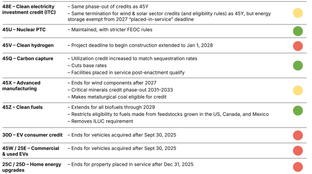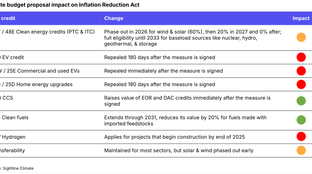
🌎 Bright spots and sunsets in the OBBB #253
One Big Beautiful Bill ushers in new (and old) energy agenda
The UK releases its lukewarm response to US and EU climate policy
Happy Monday!
The British version of a government climate tech deployment strategy dropped this week.
Meanwhile, the US is still trying to figure out its battery materials sourcing dilemma. A ratings shake-up hits the European ESG market. And the wind energy industry is bouncing back from a challenging 2022.
In deals this week, $50M for regenerative agriculture, $30M for lower-carbon maritime shipping, and $29M for nuclear fusion via stellarator.
Thanks for reading!
Not a subscriber yet?
📩 Submit deals, announcements, events & opportunities, or general curiosities for the newsletter here.
💼 Find or share roles on our job board here.
The British government released its own collection of policies to encourage investments in climate tech on Thursday. Framed as a response to the IRA in the US, the suite of announcements to accelerate deployment of clean energy and carbon capture tech comes with significantly less spending power than the American plan.
Along with reaching net zero emissions by 2050, the UK’s “Green Finance Strategy” announcements aim to drive economic growth and attract climate tech businesses—now that the post-Brexit nation is competing with the EU’s Green Industrial Plan as well as the US IRA.
“We are not going toe-to-toe with our friends and allies in some distortive global subsidy race,” Chancellor of the Exchequer Jeremy Hunt said last week. But the UK’s strategy doesn’t pack the $369B punch of the IRA.
The new policies fall short on financial incentives for the clean energy industry and on the measures needed to meet net zero goals.
The British government is working with renewables developers and communities on ways to bring new projects online more quickly, especially onshore wind, and considering how to tax carbon at its borders to protect its competitive edge against countries with fewer climate rules.
Announcements last Thursday included a list of industrial carbon capture projects the UK selected for government support. Britain plans to spend ~$25B on eight projects from companies including [big oil’s] BP Plc and Equinor ASA, which would be some of the first large-scale deployments of carbon capture and clean hydrogen production in the country.
The package also creates a new body to promote nuclear power, though there’s no sign this will bring new funding for the capex-intensive industry.
Most of the measures that will reach consumers are targeted at residential energy efficiency. “The Great British Insulation Scheme” expands eligibility for upgrade funding to 300,000 of the nation’s draftiest homes. The government also extended the voucher program for heat pumps until 2028 and plans to begin implementing changes to bring down the cost of electricity by the end of next year—a significant step toward greener homes, since electricity prices remain 3x the cost of gas in the UK.
These policies underscore home energy efficiency improvements as a national priority, with new requirements on energy performance taking effect as soon as 2025 and Britain’s wealthiest evaluating mansions based on their green tech bona fides.
The entire Green Finance Strategy also comes as the UK begins the expansion of its corporate climate-related disclosure rules, which took effect in the fiscal year that started on April 6, 2022. It’s the first G20 nation to require reporting of climate-related financial risks by law in a move that will affect ~1,300 of Britain’s largest companies.
🌾 Agreena, a Copenhagen, Denmark-based carbon market for regenerative agriculture, raised $50M in Series B funding from HV Capital, Anthemis Group, Kinnevik, AENU, and Gullspång Re:food.
🌾 Greenlabs, a Seoul, South Korea-based agriculture value chain platform, raised $38M from BRV Capital Management and SkyLake Incuvest.
🚢 Norsepower Oy, a Helsinki, Finland-based provider of rotor sail technology for maritime transport, raised $30M in Series C funding from Finnish Climate Fund, Mirova, Nefco, OGCI Climate Investments, Tesi, and VNT Management.
⚡️ Type One Energy, a Middleton, WI-based startup developing nuclear fusion powered by stellarator devices, raised $29M in Series A funding from Breakthrough Energy Ventures, Darco Capital, Doral Energy-Tech Ventures, Grantham Environmental Trust, MILFAM, Orbia Ventures, Shorewind Capital, TDK Ventures, TRIREC, and VAHOCA.
⚡️ OYA Renewables, a Toronto, Canada-based renewable energy project developer, raised $27M from City National Bank and Greenprint Capital.
🏠 Effy, a Paris, France-based marketplace for energy renovation, raised $22M from Felix Capital.
⚒️ pH7, a Burnaby, Canada-based start-up developing sustainable extraction solutions for strategic metals, raised $16M in Series A funding from BASF Venture Capital, Collaborative Fund, FM Capital, Pangaea Ventures, Rhapsody Venture Partners, and TDK Ventures.
🏠 Mixergy Ltd, a Cassington, United Kingdom-based hot water tanks and heat pumps start-up, raised $11M in Series A funding from Oxford Science Enterprises, EDP Ventures, Nesta, Centrica Innovations, Kiko Ventures, and Foresight WAE Technology.
📦 Evoco, a Toronto, Canada-based low-carbon, plant-based materials start-up, raised $9M in Series B funding from Circular Innovation Fund, Export Development Canada, and The Stuart Group.
⚡️ Cowboy Clean Fuels, a Denver, CO-based carbon negative RNG developer, raised $8M in Series A funding from Machan Investments.
🥩 Cauldron, an Orange, Australia-based “fermafacturing” startup for foods and fibers, raised $7M in Seed funding from Main Sequence Ventures and Horizons Ventures.
🌱 Manufacture 2030, an Oxford, United Kingdom-based decarbonization platform for suppliers, raised $6M in Seed funding from Amati Global Investors and Maven Capital Partners.
🌱 Connect Earth, a London, UK-based data platform for sustainable finance, raised $6M in Seed funding from Gresham House Ventures, Love Ventures, Global Brain, The Norinchukin Bank, Portfolio Ventures, Super Capital VC, Market One Capital, Mustard Seed MAZE, and Venista Ventures.
💨 Svante, a Burnaby, Canada-based solid-sorbent carbon capture technology, raised $5M in Series E funding from United Airlines Ventures.
🏠 3E Nano, 3E Nano, a Toronto, Canada-based developer of solar control coatings for windows, raised $4M in Seed funding from Energy Foundry, Creative Ventures, ACT Venture Partners, Vector Capital, New Climate Ventures, VertueLab Climate Impact Fund, and MUUS Climate Partners.
🥩 Plant Alternative, a London, UK-based startup that makes plant-based Indian ready meals, raised $2M in Seed funding from Veg Capital.
🧱 Carbonaide, a Joensuu, Finland-based carbon curing technology start-up, raised $2M in Seed funding from Lakan Betoni and Vantaan Energia.
🌱 Carbon Neutral Club, a Toronto, Canada-based incentives platform for workforce-led climate action, raised $1M in Seed funding from Blue Vision Capital, Emend Vision Fund, and Good News Ventures.
⚡️ Ontario Teachers' Pension Plan has entered into a strategic partnership with Sevana Bioenergy, a Belvedere Tiburon, CA-based large-scale anaerobic digestion projects developer, to acquire a majority stake and a capital commitment of $250 million.
💧 Digested Organics, a Farmington Hills, MI-based advanced water and wastewater filtration company, was acquired by Mott Corporation for an undisclosed amount.
⚡️ Foundation Solar Partners, a Washington, DC-based independent solar resource developer, was acquired by Birch Creek Energy for an undisclosed amount.
The Biden administration is announcing its first set of private partners and commitments under the “EV Acceleration Challenge,” including a new Google search tool to navigate EV tax credits, a charging station locator, and new financial and environmental management services provided by Wells Fargo to help corporations move to EVs.
Inflation Reduction Act battery sourcing requirements significantly limit EV tax credit eligibility. A trade agreement with Japan could help the US in accessing critical minerals by refraining from export taxes and providing Japan with eligibility for IRA tax incentives.
The European ESG market is in the hot seat. As criteria to comply with Article 9 (EU’s regulation to classify sustainable investments) tighten, asset managers including BNP Paribas, BlackRock, Amundi, and Pictet have removed the label from $190B (€175B) of funds, reducing the market by ~40%. Meanwhile, in a methodology shake up, MSCI is stripping hundreds of funds of their ESG ratings and downgrading thousands more with ~2/3rds of the European ETF market rated lower or removed.
Electric garbage trucks, tractor-trailers, and cement mixers will join consumer EVs on the streets as California requires 50% of heavy vehicles sold in the state by 2035 to be electric.
The wind industry is recovering from a 15% drop in global development of offshore and onshore capacity as economic and political headwinds subside. To overcome economic barriers, DOE released a strategy to cut costs by 30% to $51/MWh and to reach 30 GW of offshore wind by 2030. To overcome political frictions in wind facility reviews, government officials urge for collaboration and transparency. States are also taking matters into their own hands, with places like Maryland announcing plans to 4x offshore wind capacity.
IRA’s clean hydrogen tax credit faces controversy as critics argue the push for clean hydrogen will divert clean electrons from the existing grid. Across the Atlantic, the EU set rules for qualifying renewable hydrogen to ensure production comes from new wind and solar builds. To secure the renewable designation, hydrogen producers must sign power-supply contracts with new renewable power projects and align hydrogen production with clean electricity consumption over a period of 30 days.
According to IRENA (the International Renewable Energy Agency), global energy transition investments need to quadruple to $5T by 2030 to keep us within shooting distance of the Paris Agreement targets.
Prompted by Vanuatu, a small, vulnerable island nation in the Pacific, the UN has approved a request that the International Court of Justice assess and issue an opinion on whether governments have “legal obligations” to protect people from climate change.
In Zambia last Friday, Vice President Harris announced $7B of private sector commitments to ‘promote climate resilience, adaptation, and mitigation’ in Africa’s private sector. The commitment is seen as part of a broader effort to counter China’s investment in the region.
As heated negotiations around mining the seabed continue, ocean researchers warn damage to the diverse and still mostly unknown deep sea life would be irreversible.
The Taskforce on Nature-related Financial Disclosures (TNFD) released its fourth and final beta framework, which it made available in full for the first time. The proposals include core global metrics based on the same four pillars as the climate-risk disclosure framework.
The future of industrial heat is electric and could be powered by hot rocks.
Throw that carbon in a circle—along with ~700 innovators and >250 capital allocators in the latest Circular Carbon Market Report.
There could be $24B on the line for forty of the world’s largest meat and dairy companies, but only six of these livestock producers have run a climate scenario analysis, according to large investor group FAIRR.
A good man is hard to find. An experienced electrician? Impossible. The US needs ~80,000 new electricians every year, but hiring and training challenges could throw a wrench in electrification efforts.
“Everybody, VCs included, likes free money,” Sophie in Bloomberg News on large climate funds’ tilting towards IRA windmills.
Request to our brilliant readers: someone please make a livestream of the seaweed blob’s movements.
According to Pitchbook, more than 1/5th of all climate venture investment in 2022 was in deals with participation from O&G cos.
Google is rolling out a new feature in Search to alert users when a heat wave will begin and end, aiming to help users stay safe during extreme heat waves.
Skip the US News college rankings and pick a climate-friendly university.
Climate doomerism is the new climate denialism.
The EV afterlife captured on video.
And a short film reviewing the brilliant work of Professor Sir Partha Dasgupta who penned the famous report on the economics of biodiversity.
Unpredicted rain keeping you from enjoying your beach vacation? Now you can get a refund from Sensible Weather Co’s supplemental insurance for unseasonable weather vacation disturbances.
💡 Elemental Excelerator: Apply to Elemental Excelerator’s startup cohort to receive funding and support for your climate solutions. They have increased funding by 60% for its 12th startup cohort and will be providing $30m for community-based projects. Priority applications close Apr 14th!
💡 Propeller Ocean MBA: Apply for the summer session of the Propeller Ocean MBA program, an intensive bootcamp for ocean-climate founders to develop their startups. Candidates will be chosen by Apr 14th.
💡 NASA ClimateTech Startup Studio: Apply to Nasa’s 14-week cohort and work closely with mentors and experts on developing and commercializing your climate technologies. Register for a virtual lunch and learn on Apr 18th, and apply by May 22nd!
🗓️ US Climate Action Summit: Virtually attend the US Climate Action Summit on Apr 19th to participate in discussions regarding climate policy actions.
🗓️ Bloomberg Green Summit: Register for the 3rd annual Bloomberg Green Summit on Apr 26th to learn about the climate economy, greener living, global changemakers, and cleaner tech.
Strategy Associate @Brilliant Planet
Chief Executive Officer @Greentown Labs
Product Designer @Sofar
Marketing Lead @Canopy
Program Manager @The Clean Fight
Head of Impact Partnerships @Climate AI
Climate Strategy and Development (USA/Canada) @Patch
Analyst, Investments @Aspen
Associate @Valo Ventures
Feel free to 📩 send us new ideas, recent fundings, events & opportunities, or general curiosities. Have a great week ahead!

One Big Beautiful Bill ushers in new (and old) energy agenda

Climate, capital, and carrots in London's new playbook

US plays popcorn politics with biofuels and beyond